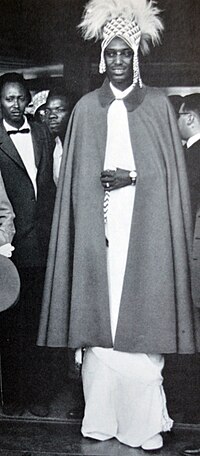List of kings of Rwanda
| Mwami of Rwanda | |
|---|---|
 | |
 | |
| Details | |
| Style | His Majesty |
| First monarch | Gihanga I |
| Last monarch | Kigeli V Ndahindurwa |
| Formation | Unknown (ancient times) |
| Abolition | 28 January 1961 |
| Residence | Nyanza, Rwanda |
| Appointer | Royal Council of Abiru |
| Pretender(s) | Prince Emmanuel Bushayija |
This article contains a list of kings of Rwanda. The Kingdom of Rwanda was ruled by sovereigns titled mwami (plural abami), and was one of the oldest and the most centralized kingdoms in the history of Central and East Africa.
Its state and affairs before King Gihanga I is largely unconfirmed and highly shrouded in mythical tales.
Kings of Rwanda
- Abami b'imishumi (descendants of Ibimanuka gods) – B.C.E
- Gihanga I
- Kanyarwanda I Gahima I
- Kimari Cya Rurenge
- Ndahiro I Bamara (Wamala)
- Ruganzu I
- Nyarume[1]
- Ntarama
- Rubanda (Lugalbanda)[1]
- Rumeza I
- Yuhi I Musindi
- Rumeza II[1]
- Ndahiro II Ruyange
- Ndahiro III Ndoba
- Ndahiro IV Samembe
- Nsoro I Samukondo
- Nsoro II Byinshi
- Ruganzu II Bwimba
- Cyilima I Rugwe
- 1st Abami Bibitekerezo (1st Common Era Kings)
- Kigeli I Mukobanya (1378–1418)
- Mibambwe I Sekarongoro I Mutabazi
- Yuhi II Gahima II
- Ndahiro V Cyamatare
- 2nd Abami Bibitekerezo (2nd Common Era Kings)

- Ruganzu III Ndoli
- Kalemera Rwaka
- Mutara I Nsoro III Semugeshi
- Kigeli II Nyamuheshera (1576–1609)
- Mibamwe II Sekarongoro II Gisanura (1609–1642)
- Yuhi III Mazimpaka (1642–1675)
- Cyilima II Rujugira (1675–1708)
- Kigeli III Ndabarasa (1708–1741)
- Mibambwe III Mutabazi II Sentabyo (1741–1746)
- Yuhi IV Gahindiro (1746–1802)
- Mutara II Rwogera (1802–1853)
- Kigeli IV Rwabugiri (1853 – November 1895)
- Mibambwe IV Rutarindwa (November 1895 – December 1896)
- Yuhi V Musinga (1883 – 13 January 1944; r. December 1896 – 12 November 1931)[2]
- Mutara III Rudahigwa (March 1911 – 25 July 1959; r. 12 November 1931[3] – 25 July 1959[4])
- Kigeli V Ndahindurwa (29 June 1936 – 16 October 2016; r. 28 July 1959[5][6] – 28 January 1961[7])
Pretenders since 1961

On 28 January 1961, during the Rwandan Revolution, the country abolished its monarchy and became a republic[7] (retroactively approved by a referendum held on 25 September of the same year).[8] Afterwards, Kigeli V Ndahindurwa continued to maintain his claim to the throne until his death on 16 October 2016 in Washington, D.C.[9] On 9 January 2017, the Royal Council of Abiru announced Prince Emmanuel Bushayija as the new heir to the throne. Prince Emmanuel adopted the regnal name Yuhi VI.[10]
See also
References
- ^ a b c Leon Delmas
- ^ "Olny.nl".
- ^ Frank K. Rusagara (2009). Resilience of a Nation: A History of the Military in Rwanda. Fountain Publishers. p. 99. ISBN 9789970190010.
- ^ Tharcisse Gatwa (2005). The Churches and Ethnic Ideology in the Rwandan Crises, 1900-1994. Regnum Books International. p. 55. ISBN 9781870345248.
- ^ "A King With No Country". Washingtonian. 27 March 2013.
- ^ Aimable Twagilimana (2007). Historical Dictionary of Rwanda. Scarecrow Press. p. xxix. ISBN 9780810864269.
- ^ a b Leonhard Praeg (2007). The Geometry of Violence. AFRICAN SUN MeDIA. p. 39. ISBN 9781920109752.
- ^ "Kigeli V: Rwandan king with no throne". 9 January 2021.
- ^ "Kigeli V Ndahindurwa, Rwandan king without a crown, dies at 80". The Washington Post. 18 October 2016.
- ^ Adrian Blomfield (12 January 2017). "Rwanda's new king is former Pepsi salesman residing in Cheshire". the Daily Telegraph. Retrieved 5 April 2017.
